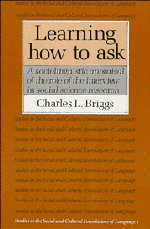 Learning How to Ask
Learning How to Ask Book contents
- Frontmatter
- Contents
- Foreword by Aaron V. Cicourel
- Preface
- 1 Introduction
- 2 The setting: Mexicano society and Córdova, New Mexico
- 3 Interview techniques vis-à-vis native metacommunicative repertoires; or, on the analysis of communicative blunders
- 4 The acquisition of metacommunicative competence
- 5 Listen before you leap: toward methodological sophistication
- 6 Conclusion: theoretical quagmires and “purely methodological” issues
- Notes
- References
- Index
Foreword by Aaron V. Cicourel
Published online by Cambridge University Press: 05 June 2012
- Frontmatter
- Contents
- Foreword by Aaron V. Cicourel
- Preface
- 1 Introduction
- 2 The setting: Mexicano society and Córdova, New Mexico
- 3 Interview techniques vis-à-vis native metacommunicative repertoires; or, on the analysis of communicative blunders
- 4 The acquisition of metacommunicative competence
- 5 Listen before you leap: toward methodological sophistication
- 6 Conclusion: theoretical quagmires and “purely methodological” issues
- Notes
- References
- Index
Summary
The most ubiquitous aspect of social science research is its reliance on talking to people about their experiences, attitudes, opinions, complaints, feelings and emotions, and beliefs. There is by now a huge literature on the problems of obtaining information from informants, respondents, and subjects. Why another book on interviewing? When I agreed to review this book for Cambridge University Press I posed hypothetical questions about the possible content of the manuscript and the types of issues it could raise. I did not know Charles Briggs at the time but was told he had been trained in anthropological linguistics and folklore. I was pleased to find that Briggs had used a sociolinguistic approach to interviewing and that he was preoccupied with a central issue of field research: the researcher's discovery of errors in her or his tape-recorded interviews. Although such errors are inevitable, they need to be pointed out to the reader at all times. I immediately agreed with several key points by Briggs: Interviewing errors are seldom reported, and the interview technique invariably imposes one set of communicative norms on the setting while researchers ignore the extent to which a speech community is organized along opposing lines.
Social scientists use interview techniques in field settings while ignoring the nature of communication in the different cultures in which they conduct these interviews. The same point can be made about those researchers who only conduct research in their own culture and ignore the wide range of communicative repertoires that exist.
- Type
- Chapter
- Information
- Learning How to AskA Sociolinguistic Appraisal of the Role of the Interview in Social Science Research, pp. ix - xiiPublisher: Cambridge University PressPrint publication year: 1986
- 1
- Cited by
